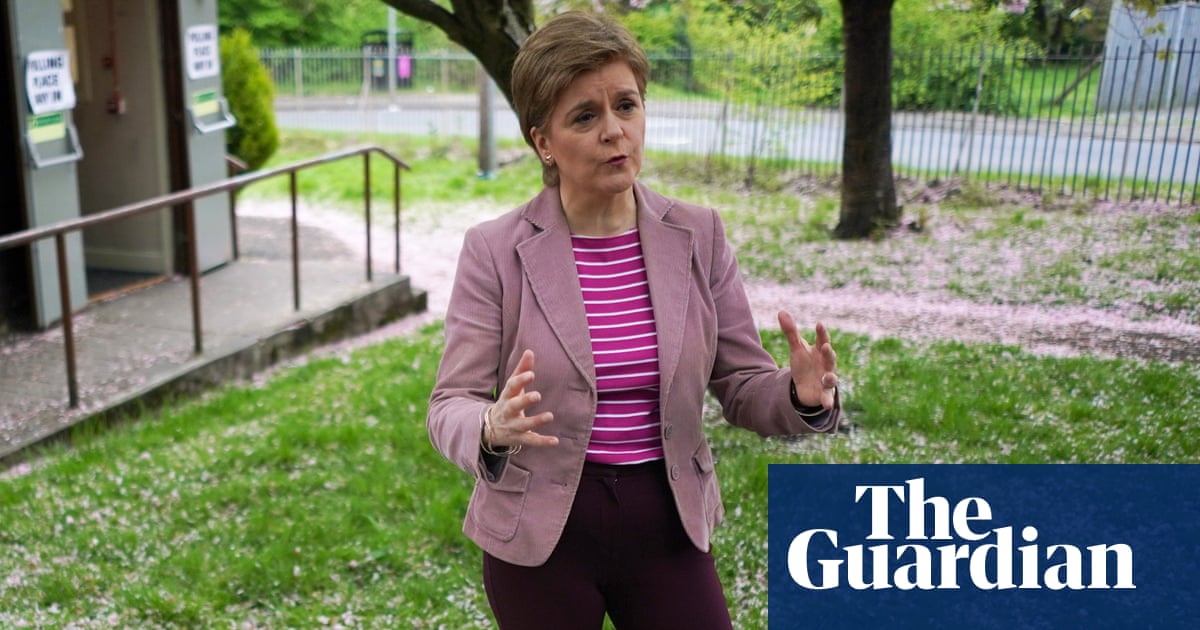
Boris Johnson will not oppose a second independence referendum if the Scottish National party wins a majority in the election next month, Nicola Sturgeon has said, with some UK government ministers reportedly conceding it is an inevitability.
In an interview with the Guardian, Scotland’s first minister said: “If people in Scotland vote for a party saying, ‘when the time is right, there should be an independence referendum’, you cannot stand in the way of that – and I don’t think that is what will happen.”
Downing Street insiders suggested there may be tactical attempts to keep the inevitability of a referendum in play, but that the prime minister was staunchly against such a move.
The UK government has quietly dropped the use of “once-in-a-generation” language around the referendum due to fears it may give Scottish voters who are still undecided about independence – but keen on Sturgeon’s other policies – a licence to vote for the SNP if they believe there is no chance a referendum will be granted.
But Johnson is said to be adamant in private that he will not be the prime minister who permits a referendum and the Conservatives will hammer home the message that holding such a poll during a pandemic would be deeply irresponsible.
Reports in the Sunday Times suggested that, while the UK government’s position remained that it was opposed to granting Holyrood the requisite powers to hold a legal referendum, senior Tories believe this would be hard to sustain should the SNP triumph on 6 May, and that Johnson would be better off forcing a vote during the economic upheaval likely to follow the pandemic to underline the risks of Scotland leaving the UK.
Last week, polling by Ipsos Mori for STV News and Opinium for Sky News put the SNP on course to win a majority and a historic fourth term.
Asked whether she believed the alternative to continued Westminster refusal, of putting a referendum bill through the Scottish parliament, would be necessary, Sturgeon said: “I’m pretty confident that it won’t be. But you know, people will always challenge that because of what the supposed position of the UK government is.”
She said she believed discussion within the UK government had “moved away from ‘we can stop a referendum’ to ‘when would it happen, and on what basis would it happen?’”
A Panelbase poll for the Sunday Times found that if the SNP were to win a majority, Scottish voters would be evenly split over whether there should be a referendum, with 44% in favour and the same proportion against.
Sturgeon also raised concerns about the tactics of Alba, the new party that Alex Salmond claims can help secure a “supermajority” for independence, a term she dismissed as “daft rhetoric”. A simple majority of pro-independence MSPs would provide a sufficient mandate, she maintained.
Sturgeon said she believed her predecessor’s talk of demonstrations and unauthorised plebiscites could put off undecided voters who had become more open-minded about independence since Brexit.
“If you’re somebody that voted no in 2014 and that, because of Brexit or other things, are now open-minded to independence – and I know an awful lot of these people – and you hear somebody say they think they can bulldoze their way to independence in spite of public opinion, I would think: ‘Maybe I don’t want to engage in this any more,’” she said.
Sturgeon said she would continue to give “the honest answer” about her concerns regarding Salmond’s suitability to return to public office following accusations of sexual harassment, which he has vehemently denied.
“In my opinion, are there questions about the appropriateness of the return to public office of somebody who was accused of serious inappropriate behaviour towards women – who was acquitted of any criminality and I will never question that – who in the course of a criminal trial seemed to suggest that he had behaved in ways that were not always appropriate, admitted something to me that I believe was deeply inappropriate, and has never really reckoned with that, has never reflected and been prepared to say: ‘I regret that and wouldn’t do that again in the future.’”
She also agreed the fallout from the Scottish government’s botched handling of sexual harassment complaints against Salmond was likely to have discouraged other women from coming forward.
Sturgeon said that probably none of the resulting inquiries had got to the bottom of the “culture of complicity” around Salmond’s alleged inappropriate behaviour described by the original complainers in evidence to the Holyrood committee. And she committed to the SNP reflecting on its complaints processes and procedures in the light of the inquiries.












